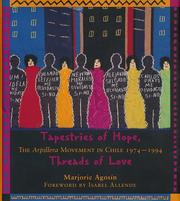Check nearby libraries
Buy this book

"Arpilleras are burlap-backed tapestries depicting the experiences and emotions of women whose sons and husbands were arrested and never heard from again during the years of military rule. Agosin's narrative traces the arpillera movement from its early days under the promotion and protection of the Catholic Church's Vicaría de Solidaridad through the early 1990s, when newly reestablished civilian authorities decided not to more forcefully seek justice for victims of human rights abuses. The book includes 45 reproductions (on glossy plates), and the moving testimonies of a number of the arpilleristas themselves"--Handbook of Latin American Studies, v. 57.
Check nearby libraries
Buy this book

Subjects
Women in politics, Disappeared persons, Politics and government, Women, Political activity, Women, political activity, Chile, politics and government, Arpilleras, Tapestry, Femmes, Activité politique, Politique et gouvernement, Personnes disparues, POLITICAL SCIENCE, Political Process, General, Verschleppung, Widerstand, Frau, Verzetsbewegingen, Vrouwen, Tapijtkunst, Militaire dictatuur, MUJERES EN LA POLITICA, CHILE, POLITICA Y GOBIERNO, DETENIDOS DESAPARECIDOS, ARPILLERISTAS, Geschichte 1974-1994Times
1973-| Edition | Availability |
|---|---|
|
1
Tapestries of hope, threads of love: the arpillera movement in Chile
2007, Rowman & Littlefield Publishers, Inc., Rowman & Littlefield Publishers
in English
- 2nd ed.
0742540022 9780742540026
|
zzzz
|
|
2
Tapestries of hope, threads of love: the arpillera movement in Chile, 1974-1994
1996, University of New Mexico Press
in English
- 1st ed.
0826316913 9780826316912
|
zzzz
|
|
3
Tapestries of hope, threads of love: the arpillera movement in Chile, 1974-1994
1996, University of New Mexico Press
in English
- 1st ed.
0826316913 9780826316912
|
aaaa
|
Book Details
Edition Notes
Includes bibliographical references (p. [141]-142).
Classifications
The Physical Object
Edition Identifiers
Work Identifiers
Work Description
This book tells the story of ordinary women living in terror and extreme poverty under General Pinochet's oppressive rule in Chile (1973-89) and how their lives did and did not change following his reign. These women defied the military dictatorship by embroidering their sorrow on scraps of cloth and using their needles and thread as one of the boldest means of popular protest and resistance in Latin America.
The arpilleras they made - patch-work tapestries with scenes of everyday life and memorials to their disappeared relatives - were smuggled out of Chile and brought to the world the story of their fruitless searches in jails, morgues, government offices, and the tribunals of law for their husbands, brothers, and sons.
Marjorie Agosin, herself a native of and exile from Chile, has spent over twenty years interviewing the arpilleristas and following their work. She knows their stories intimately and knows, too, that not one of them has ever found a disappeared relative alive. Still, many of them maintain hope and continue to make their arpilleras. Even though the dictatorship ended in 1989 and democracy returned to Chile, no full account of the detained and disappeared has ever been offered.
This book includes a history of the women's movement, testimonies from the women in their own words, and, for the first time, full color plates of their beautiful, moving, and ultimately hopeful arpilleras. Anyone interested in the history of contemporary Latin America will want to read this powerful story.
Community Reviews (0)
History
- Created April 1, 2008
- 9 revisions
Wikipedia citation
×CloseCopy and paste this code into your Wikipedia page. Need help?
| July 30, 2010 | Edited by IdentifierBot | added LibraryThing ID |
| April 25, 2010 | Edited by Open Library Bot | Add goodreads IDs. |
| April 14, 2010 | Edited by Open Library Bot | Linked existing covers to the edition. |
| April 13, 2010 | Edited by bgimpertBot | Added goodreads ID. |
| April 1, 2008 | Created by an anonymous user | Imported from Scriblio MARC record |











